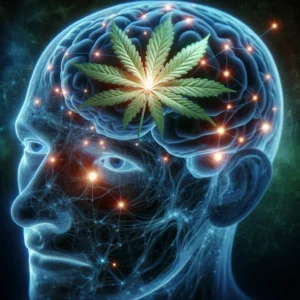The Powerful Effects of Cannabis on Memory and Cognition: A Comprehensive Overview
 Cannabis is a plant with a long and complex history, often associated with a flurry of social, legal, and health-related debates. The psychoactive effects of its main components, tetrahydrocannabinol (THC) and cannabidiol (CBD), have piqued the curiosity of researchers and laypeople alike. Among the myriad of questions regarding cannabis, one of the most pertinent for both its proponents and detractors is how this plant affects memory and cognition.
Cannabis is a plant with a long and complex history, often associated with a flurry of social, legal, and health-related debates. The psychoactive effects of its main components, tetrahydrocannabinol (THC) and cannabidiol (CBD), have piqued the curiosity of researchers and laypeople alike. Among the myriad of questions regarding cannabis, one of the most pertinent for both its proponents and detractors is how this plant affects memory and cognition.
Understanding the implications of cannabis on our ability to remember, think, and learn is crucial, given the increasing acceptance of its use around the world. This article aims to demystify the relationship between cannabis and cognitive function, shedding light on both the potential risks and surprising benefits.
Understanding Cannabis and Its Components
Before we can address the issue at hand, it’s essential to understand the fundamental components of cannabis. This multifaceted plant contains over 100 different cannabinoids, but THC and CBD stand out as the most well-known and researched.
THC is the primary psychoactive compound in cannabis, responsible for the “high” sensation that users experience. It’s also the element most commonly associated with potential cognitive impacts. On the other hand, CBD, which does not produce a high, has been linked to various potential cognitive benefits and neuroprotective properties.
Both THC and CBD interact with the body’s endocannabinoid system, a complex network of receptors that play a vital role in maintaining homeostasis.
Short-Term Effects on Memory and Cognition
After the consumption of cannabis, be it through smoking, vaping, or ingesting edibles, users can experience a range of cognitive changes. These short-term effects are particularly noticeable in memory and cognitive functions.
Immediate Impacts on Memory
The anecdotal phenomenon of “forgetfulness” or “short-term memory impairment” following cannabis use has a basis in scientific reality. THC, when binding to the endocannabinoid receptors in the brain, disrupts the normal functioning of the hippocampus, a region critical in forming new memories.
THC and Cognitive Functions
Studies have shown that acute THC consumption can alter various cognitive functions, including attention, decision-making, and reaction time. These effects are usually transient but can be significant, particularly at higher doses.
The precise mechanism behind these short-term impacts is not fully understood, but it’s thought to involve the perturbation of neurotransmitter release and the brain’s networking patterns.
Long-Term Cognitive Effects
The potential long-term effects of cannabis on memory and cognition, especially in chronic users, are of particular interest to researchers. Chronic heavy use of cannabis has been associated with memory impairments and diminished cognitive performance, although the causative relationship is still being explored.
Research on Chronic Use
Numerous studies have sought to unravel the impacts of long-term cannabis use. Findings suggest that while occasional use may not have lasting effects, chronic use—particularly starting in adolescence or young adulthood—may lead to persistent cognitive deficits and a decrease in IQ points.
Researchers have also observed alterations in brain structure and function, which could be indicative of cannabis-induced neuroplasticity changes. It’s worth noting that the brain’s plasticity refers to its ability to reorganize pathways, which is essential for learning and memory.
The Adolescent Brain
Adolescents are at a critical stage of neurodevelopment, making them particularly vulnerable to cannabis-induced changes. Some evidence suggests that cannabis use during this period can result in long-lasting cognitive consequences, potentially due to the endocannabinoid system’s role in brain maturation.
These findings underline the importance of age and frequency of use when evaluating the cognitive impacts of cannabis.
Positive Aspects of Cannabis on Cognition
While the focus often centers on the impairments, there’s increasing acknowledgment of the potential cognitive benefits of cannabis, particularly of CBD.
Therapeutic Potential of CBD
CBD has garnered attention as a potential treatment for various cognitive health conditions. It shows promise in enhancing neurogenesis (the creation of new neurons) and reducing neuroinflammation, potentially offering protective effects against cognitive decline.
Research into the potential benefits of CBD is still in its early stages, but studies have highlighted its anxiolytic and antipsychotic properties, which could positively influence cognitive function for individuals with anxiety or psychosis-related conditions.
Regulatory and Medical Perspectives
The regulatory environment surrounding cannabis is complex and varies greatly from region to region. However, a trend toward decriminalization and legalization for medicinal use reflects a shifting perception of cannabis within society.
Medical Community and Cannabis Use
The medical community has taken a cautious stance on recommending cannabis for cognitive health, stressing the need for robust clinical evidence. However, for conditions like epilepsy and PTSD, where traditional treatments often fail, some medical professionals are open to considering cannabis-based medicines.
Current Regulatory Landscape
Regulations dictate the avenues through which we can explore cannabis’s effects on memory and cognition. They also impact the ability to conduct research, causing a knowledge gap in the field. More liberal policies around cannabis research are necessary to inform both medical guidance and public health policies.
Conclusion
The question of how cannabis affects memory and cognition is one without a simple or universal answer. While it’s clear that the plant’s components can exert potent effects on our cognitive faculties, the nuances, such as dose, frequency, timing, and individual differences, come into play.
As cannabis continues to find its place in modern medicine and beyond, it’s crucial to advance our understanding of its interactions within the human brain. Responsible use, informed by the latest research, should underpin any discussion about cannabis and cognitive health.
For those considering cannabis as part of their health regimen, consulting with a medical professional is paramount. Personalized guidance can help users make informed choices that weigh the potential benefits against the known and unknown risks.
The evolving dialog around cannabis and cognitive function highlights the need for continued, rigorous research. Only with more studies will we be able to definitively answer the overarching question of cannabis’s effect on memory and cognition. Until then, responsible and educated consumption remains the best approach.




